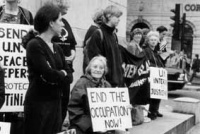Palestine/Israel reflection: You come from Germany?

Women in Black at an earlier vigil
On Friday, 9 September, our group of mostly German Mennonites, in the first German-speaking CPT delegation, participated in a Women in Black vigil. The Women in Black are Israelis, including Holocaust survivors, who silently protest the Israeli occupation of the land of Palestine by gathering at the same spot in West Jerusalem at the same time every week since the first Intifada. They hold up signs in the shape of a black hand bearing the slogan, "End the Occupation" in Hebrew, Arabic, and English.
At the vigil we encountered animosity by Israeli passers-by and many of us felt uncomfortable taking part in the protest because German history. However, although we could respond to insulting gestures and shouting and even aggressive Israeli youth by smiling and silently praying for them, we were not prepared for one particular Jewish reaction, even though we all knew exactly what that reaction would be. The challenge of how Germans, responsible for the Holocaust and the extermination of six million Jews, could dare criticize Israel, the perceived safe haven for the Jewish people.
And of course, exactly that happened. During the protest, an angry Jewish American confronted us and asked one of us accusingly: "Where do you come from?" My colleague stuttered, "Germany."
"FROM GERMANY?!?! SHE COMES FROM GERMANY! THESE PEOPLE COME FROM GERMANY!" He was screaming it at all the cars stopped at the lights. And at her.
I felt paralyzed. This reaction was the thing I was most afraid of during my stay here in Palestine/Israel: "You, a German, sent us to the gas. How dare you criticize us?!"
Although the Holocaust happened almost seventy years ago and I personally had nothing to with it, wasn't he still right? Are there not other issues more appropriate for Germans to protest? Some issues not as historically loaded?
Several Israelis have told our group that we Germans should stop treating Israel as a special case. We should treat the human rights violations of the occupation as such and not justify them with the Shoah.
This response was helpful, but I still had a troubled conscience. We asked the Women in Black what they felt and one of them said: "You're our friends and you're standing with us in solidarity. You haven't just come here with your own agenda, demanding something. You came and looked for Israelis whom you could support. The oldest amongst us Women in Black are German Jews who had to flee the Nazis. Now we are living here and protesting the occupation. The man who attacked you does not even live here, and yet still he thinks he knows who's allowed to criticize Israel and who isn't. It is terribly embarrassing for us to have such people as him here in Israel."
I will continue to ask myself the question what I as a German can say and do about the Israeli-Palestinian conflict and what I can't. But these brave Israeli women have helped me overcome a large part of my guilt complex.
For more information on the Christian Peacemaker teams work in Palestine see: www.cpt.org/work/palestine















